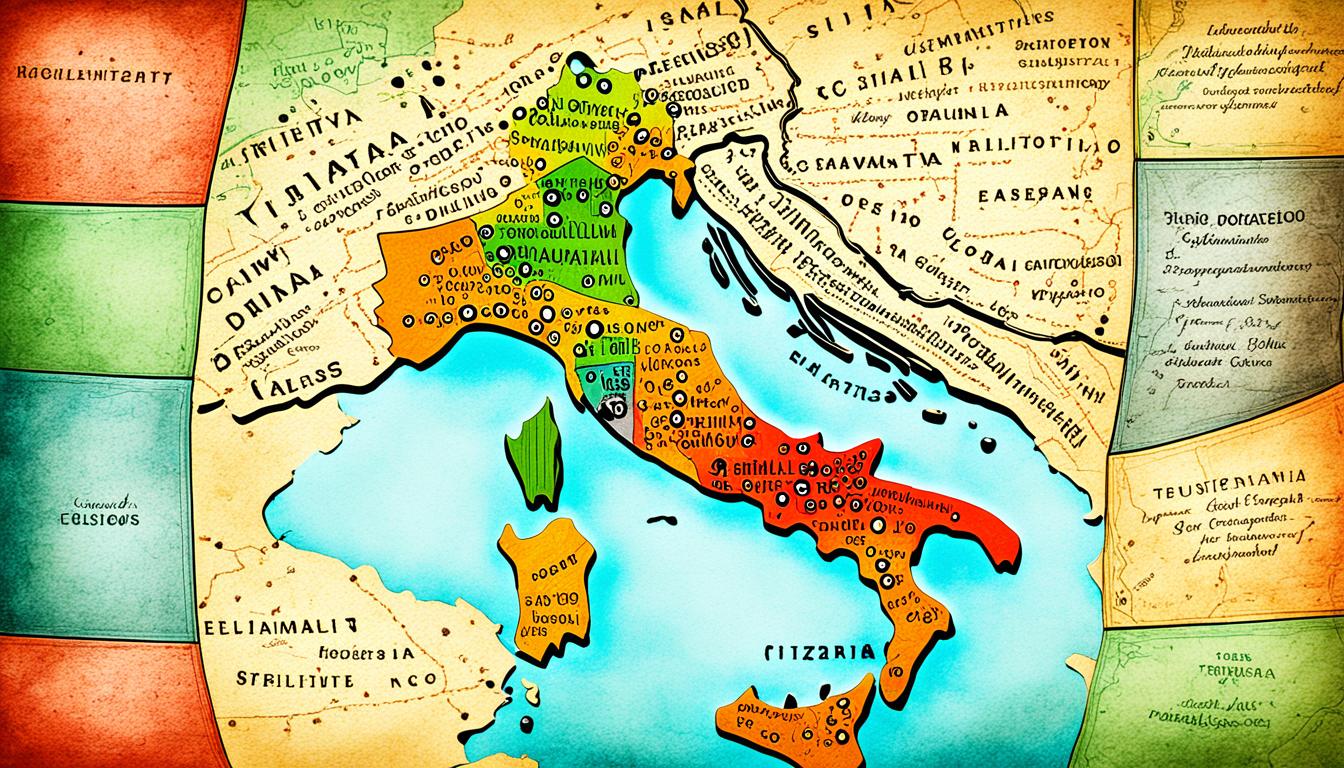Italy offers many options for those wanting to set up a business there. This guide will explain the different legal structures you can choose from. It will focus on the legal entities in Italy that help form a business. Choosing the right legal structure is key for foreign investors, like those from the UK. It affects how well your business runs and follows the law. We will look at the different legal frameworks and what they mean for businesses in Italy.
Key Takeaways
- Understand the importance of selecting the right legal entity for your business.
- Familiarise yourself with Italy’s common business structures.
- Recognise the significance of compliance and regulatory requirements.
- Learn about the advantages of various legal frameworks for foreign investors.
- Explore the steps needed for successful business formation in Italy.
Overview of Legal Structures in Italy
In Italy, businesses can choose from many legal structures. It’s key for both local and foreign investors to know these options. They include limited liability companies, joint-stock companies, and partnerships. Each has its own rules under Italy’s commercial law.
These structures protect the business and the public. Knowing them helps entrepreneurs deal with laws better. Staying in line with the law makes business run smoother and builds trust with people outside the company.
Getting advice from a legal expert is very helpful when picking a structure. They can explain the good and bad of each type. This ensures you follow the law and make smart choices for your business. It’s important to think about Italy’s legal scene before starting a business.
| Legal Structure | Key Characteristics | Advantages |
|---|---|---|
| Società a Responsabilità Limitata (SRL) | Limited liability for members, flexibility in management | Attracts investors, easier to manage |
| Società per Azioni (SPA) | Share capital divided into shares, suitable for larger businesses | Access to capital markets, limited liability |
| Partnerships | Shared ownership, responsibilities, and profits | Simple structure, tax transparency |
| Branch Offices | Extensions of foreign companies, subject to local regulations | Direct access to the Italian market |
| Representative Offices | No commercial activity allowed, functions are limited | Lower establishment costs, useful for market research |
Types of Business Entities in Italy
Italy has many business types for foreign investors wanting to set up shop. It’s key to know these options to pick the best one for your business.
Here are some common choices:
- Società a Responsabilità Limitata (SRL): This limited liability company is popular for its flexibility and limited personal risk.
- Società per Azioni (SPA): A public limited company with a big capital base, great for big businesses.
- Simplified Limited Liability Company (SRLS): A simpler version of the SRL for small businesses, needing fewer initial steps.
- Partnerships: ‘Società semplice’ and ‘società in nome collettivo’ are for professionals and small businesses.
- Branch Offices: Set up by foreign companies to work directly in Italy, keeping some independence.
- Representative Offices: Mainly for market research, these can’t do their own business.
Each business type in Italy has its own rules and features. This helps UK businesses make informed choices. By looking at these options, entrepreneurs can match their business plans with Italy’s laws and goals.
Legal Structures Explained
It’s key to know the different legal structures in Italy for a business to do well. The choice of legal structure affects things like liability, taxes, and how flexible a business can be. This part looks at what to think about when making this choice, helping those looking to invest make smart decisions.
Importance of Choosing the Right Structure
Choosing the right legal structure is crucial for a business’s future. It helps reduce risks in liability and taxes and can help a business grow. Each type of business has its own rules, duties, and perks, which change how a business works. Looking into these carefully makes sure the business meets its goals.
Common Considerations for UK Entities
UK businesses thinking of entering the Italian market need to look at a few things:
- Market Entry Strategies: It’s important to know the local market and who you’re up against to pick the best structure.
- Cultural Nuances: Getting used to Italy’s business ways and culture is key when starting up.
- Legal Pitfalls: Knowing about legal issues and what you must follow is important to avoid big mistakes.
Società a Responsabilità Limitata (SRL)

The Società a Responsabilità Limitata, or SRL, is a common type of limited liability company in Italy. It’s important to know about SRL if you’re thinking of starting a business here. This type of company lets people limit their personal risk while still having a formal business setup.
Definition and Key Features
The SRL follows certain rules that make it clear and safe for investors. Key features of the SRL include:
- It needs a minimum of €10,000 in share capital, with at least 25% paid at the start.
- It offers limited liability, keeping personal assets safe from business debts.
- It’s flexible in management, allowing one or more directors to run the company.
- It must have a detailed statute that sets out how the company will be run and governed.
Advantages of SRL for Foreign Investors
Foreign investors find many benefits in choosing SRL for their Italian business. These benefits include:
- Less personal risk thanks to limited liability.
- More trust from suppliers and clients because of its recognised business format.
- Tax advantages from business deductions and write-offs, which can save money.
- It’s easier to get funding from banks and financial institutions because it’s a known business type.
| Feature | Description |
|---|---|
| Minimum Share Capital | €10,000 with 25% paid at incorporation. |
| Liability | Limited to the amount invested in the company. |
| Management Structure | Can have one or more directors. |
| Regulatory Framework | Requires a detailed statute upon establishment. |
Società per Azioni (SPA)
The Società per Azioni (SPA) is a key business structure in Italy, mainly for big companies. It’s important for investors and business owners to know about SPA. This type of company has specific rules about share capital and limits on what shareholders can lose, making it popular in many business settings.
Characteristics of an SPA
An SPA needs a minimum amount of share capital, which is often more than what a Società a Responsabilità Limitata (SRL) requires. The share capital must be paid in full when the company starts, making sure the company has enough money to run. Shareholders in an SPA are only liable for their shares, keeping their personal assets safe. Also, SPAs must follow strict rules for financial reporting, which makes things more transparent.
Comparative Benefits Over Other Structures
Looking at the benefits of an SPA shows it has many advantages over an SRL. An SPA makes it easier for companies to get money from the stock market by selling shares to the public. Being able to list shares publicly can really boost a company’s image and trustworthiness in the market. On the other hand, SRLs can’t raise as much money and don’t have the same market exposure as SPAs. This shows why choosing an SPA is a smart move for big companies looking to grow and expand.
Simplified Limited Liability Company (SRLS)
The Simplified Limited Liability Company (SRLS) is a great choice for small businesses and startups in Italy. It’s all about making things easier and faster for new entrepreneurs. With the SRLS definition, starting a business is simpler, saving time and effort.
An SRLS has a simplified company structure. You can start with just €1, which is much lower than before. It also means less paperwork and less red tape, making it easier to get your business up and running.
One of the big perks of an SRLS is how flexible it is. You can run the business on your own, giving you full control. It also means easier accounting, which is great for new businesses looking to grow fast without getting bogged down in paperwork.
In short, the SRLS is a great option for entrepreneurs in Italy. It’s easy to start with low costs and less paperwork. This helps with innovation and growth in the region.
| Feature | SRLS | Traditional SRL |
|---|---|---|
| Minimum Capital Requirement | €1 | €10,000 |
| Number of Members | 1 or more | 1 or more |
| Management Structure | Simplified, single-member management possible | Typically requires a board |
| Accounting Requirements | Reduced | Extensive |
| Registration Process | Simplified | Standard |
Partnerships in Italy: A General Overview
Partnerships in Italy offer a flexible way to run a business. It’s key for UK companies looking to work together in Italy to know the different types of partnerships. Each type has its own rules, legal bits, and what the partners must do.
Types of Partnerships
Italy has two main types of partnerships: general and limited partnerships. In a general partnership, all partners run the business and are equally responsible for debts. Limited partnerships have general partners who run the business and limited partners who are only at risk up to their investment.
- General Partnership (Società semplice): All partners share liabilities and can participate in management.
- Limited Partnership (Società in accomandita semplice): Composed of one or more general partners and limited partners who have liability limited to their capital contribution.
How Partnerships Operate in Italy
To start a partnership in Italy, you must register with the Italian Business Register. You also need a partnership agreement that covers roles, duties, and how profits are shared. General partners risk their personal assets if the partnership owes money. But, limited partners are only at risk up to what they invested.
| Partnership Type | Liability | Management |
|---|---|---|
| General Partnership | Unlimited Liability | All Partners |
| Limited Partnership | Limited to Investment | General Partners |
Branch Offices: Legal Framework

Branch offices in Italy are unique, aiming to bring a parent company’s activities into the Italian market. They follow a specific legal setup that outlines their rights and duties. It’s vital to know the rules for running a branch in Italy to avoid legal issues.
To set up a branch, foreign companies must register with the Italian Companies Register. They need to show proof of the parent company, its official documents, and its global business activities. Also, they must appoint a local representative to handle the branch’s affairs.
Taxes are a big deal for foreign branches in Italy. The income made by the branch is taxed at Italian corporate rates. This can affect profits. Also, the parent company might be responsible for the branch’s debts, showing the importance of careful planning.
For foreign businesses eyeing the Italian market, it’s key to grasp the branch office laws. With the right advice, you can dodge tax and compliance problems. This makes entering the Italian market easier.
Representative Offices: Functionality and Limitations
Foreign businesses need to know how representative offices work in Italy. These offices have special roles that set them apart from branch offices. They help with operations in Italy but have limits that affect their use for business.
Key Differences Between Branch and Representative Offices
Representative offices in Italy are mainly for non-business tasks. They don’t make money, which makes them simpler for companies wanting to check out the market. Branch offices, on the other hand, can do business, like selling things and making deals. Representative offices are better for marketing, research, and helping customers.
| Aspect | Representative Office | Branch Office |
|---|---|---|
| Purpose | Marketing and support | Commercial activities |
| Profit Generation | Cannot generate profit | Can generate profit |
| Liability | Limited to local expenses | Full liability |
| Regulatory Burden | Lower | Higher |
This way, foreign investors can try out the Italian market with little risk. Knowing the difference between branch and representative offices helps decide the best way to enter the Italian market.
Tax Implications of Various Legal Structures
It’s key for businesses to know how Italy taxes different legal structures. The tax rules change based on the type of entity, affecting how a business runs and its finances.
In Italy, the main business tax is the corporate income tax, or IRES, with a standard rate of 24%. This tax is for all companies and partnerships. There’s also IRAP, a regional tax that varies by location, usually between 3.9% to 4.82%.
Different legal structures have different VAT rules. Standard VAT is 22% for most goods and services. But, some sectors like food and pharmaceuticals get lower rates. Knowing these details is important for staying in line with the law and planning finances.
Capital gains taxes also vary by legal structure. For example, a corporation might pay more in capital gains tax than an individual when selling assets. This can greatly impact profits and should be thought about when choosing a legal structure.
Understanding Italy’s tax rules helps businesses, especially those from the UK, make better legal structure choices. This knowledge is crucial for following the law and planning strategically.
Compliance and Regulatory Requirements
Starting a business in Italy means you have to follow many rules. It’s crucial to know these rules to keep your business legal and running well. You’ll need to get the right licences and keep up with reports.
Essential Licences and Permits
To legally run a business in Italy, you must get the right licences and permits. Here are some common ones you might need:
- Commercial Licences
- Sector-specific Permits
- Health and Safety Certifications
- Environmental Licences
If you don’t get these licences, you could face fines or have to stop working. Each type of business has its own set of rules. These rules are part of what makes doing business in Italy complex.
Ongoing Reporting Obligations
After getting your licences, you also have to keep up with regular reports. These reports include:
- Annual Financial Statements
- Tax Returns and Contributions
- Publication of Corporate Changes
- Labour Compliance Reports
Following these rules is important for keeping a good reputation and avoiding fines. Knowing all about Italy’s rules is crucial for success in the Italian market.
Getting Started: Steps to Establishing a Business

Starting a business in Italy means following several key steps. It’s vital to plan well to launch your venture successfully. First, you need to prepare for the registration process in Italy. This includes doing market research and making a detailed business plan to check if your idea works.
Choosing the right legal structure is also crucial. This decision affects how your business runs.
Preliminary Considerations Before Registration
Before you start the registration, think about these important points:
- Market Research: Learn what the local market needs and who your customers will be.
- Business Planning: Create a detailed plan that outlines your goals and how you’ll achieve them.
- Legal Structure: Pick the right legal form, like an SRL or SPA, that fits your business aims.
The Registration Process Explained
The steps to register a business in Italy include:
- Obtain a Fiscal Code: Get a unique tax ID code.
- Draft Articles of Association: Write and notarise the basic documents.
- Deposit Share Capital: Put the initial capital in a bank account if needed.
- Register with the Companies Register: Send in your documents to the local authority.
- Obtain Licenses and Permits: Find and apply for any special licenses for your business.
Finishing these steps makes sure your business starts legally in Italy. It sets the stage for growth and success.
Common Pitfalls in Choosing Legal Structures
Choosing the right legal structure for a business in Italy is key. Many entrepreneurs face big problems. Knowing about these common mistakes can help avoid risks when starting out.
One big mistake is underestimating tax costs. Each type of business, like a Società a Responsabilità Limitata (SRL) or a Società per Azioni (SPA), has its own tax rules. These rules can greatly affect profits. It’s vital to understand these taxes to avoid surprise costs.
Another big mistake is not knowing the rules well enough. Businesses that don’t check on the licences and permits needed can face delays. Not following these rules can lead to fines and harm the business.
Some owners also forget to think about how their business might grow. Picking a structure that can’t change can stop growth. Seeing the need for flexibility can help avoid these problems.
In short, to avoid these mistakes, you need to prepare well and keep learning. Knowing about the risks of choosing legal structures can save time and money. It helps make starting a business in Italy successful.
Hiring Legal and Financial Advisors in Italy
Starting a business in Italy can be tough, especially with its complex legal and financial rules. Getting help from skilled advisors is a big plus. They offer specific support to entrepreneurs and investors. This helps them deal with laws and make the best business plans.
Importance of Professional Guidance
Getting advisors in Italy can make setting up your business easier. Here are some main reasons why their skills are so important:
- Compliance Support: They make sure you follow the law and avoid legal problems later.
- Tax Efficiency: Advisors in Italy help you understand taxes to cut down on costs.
- Strategic Planning: They give advice on growth chances and market trends to improve your decisions.
- Risk Management: They help spot potential issues early, so you can act quickly.
Using legal consultants for company laws or financial advisors for tax plans makes your business stronger.
Comparing UK and Italian Legal Structures
The legal systems in the UK and Italy show both similarities and differences. These differences are key for UK businesses looking to enter the Italian market. A detailed look at these systems shows how they work.
Both the UK and Italy value transparency and accountability in companies. UK companies enjoy a simple set of rules, while Italy’s rules can be complex. For example, UK firms usually have a single board focusing on shareholders. Italy’s firms often have two boards for different groups of people.
Legal rules also differ. UK companies have fewer reporting duties than Italian ones, which have stricter rules. Knowing the laws of international business is crucial for companies moving across borders.
When working across borders, companies must pay close attention to employment laws, taxes, and official records. UK businesses should look into Italy’s specific laws to shape their business plans.
| Aspect | UK | Italy |
|---|---|---|
| Legal Structure Complexity | Lower complexity due to clear regulations | Higher complexity with dual board systems |
| Compliance Requirements | Less stringent ongoing obligations | Stricter reporting and compliance rules |
| Corporate Governance | Single-tier board structure | Dual-board structure for broader stakeholder engagement |
| International Business Law Applicability | Focus on efficiency and flexibility | Emphasis on regional regulations compliance |
Future Trends in Italian Business Structures
The business world in Italy is changing fast, thanks to new technologies and trends. Companies are now using digital tools to make things run smoother, improve customer service, and cut costs. This change is making old business models outdated, leading to new ways of doing things that meet today’s needs.
Sustainability is also a big deal for Italian businesses now. With more rules about the environment, companies are going green. This means they’re focusing on being eco-friendly to match what customers want. So, businesses in Italy are changing to stay ahead in a fast-changing market.
New economic policies in Italy are also making it easier for foreign investors to come in, especially from the UK. These policies support flexible business models and encourage new startups. Knowing about these changes can help UK investors make smart choices when looking to grow in Italy.
FAQ
What are the common legal structures available for businesses in Italy?
In Italy, businesses can choose from Società a Responsabilità Limitata (SRL), Società per Azioni (SPA), Simplified Limited Liability Company (SRLS), and partnerships. Each type has its own rules about liability, taxes, and how it works.
What is the importance of choosing the right business structure in Italy?
Choosing the right business structure is key. It affects how much you’re liable for, your taxes, and how flexible you can be. Making an informed choice helps businesses fit into the Italian market and follow the law.
How does the SRL differ from other company types in Italy?
The SRL is a type of limited liability company. It needs a minimum amount of money to start and has a flexible way of managing. It’s often chosen by smaller companies or foreign investors because it limits their liability.
What are the tax implications for businesses operating in Italy?
Businesses in Italy face different taxes like corporate tax, VAT, and taxes on capital gains. It’s crucial to understand these taxes for financial planning, especially for UK companies in Italy.
Can foreign businesses establish a branch office in Italy?
Yes, foreign companies can open a branch office in Italy. This office works under Italian laws but is different from a subsidiary in taxes, liability, and what it can do.
What is the difference between a branch office and a representative office in Italy?
A branch office can make money and do business activities. A representative office can only market and can’t make profits. This makes representative offices simpler and good for companies checking the market.
What licenses and permits are required to operate a business in Italy?
Businesses in Italy need specific licenses and permits based on their industry. Following the rules is important to avoid legal issues and run smoothly.
What are common mistakes business owners make when choosing a legal structure in Italy?
Business owners often underestimate taxes, miss the details of different company types, and don’t check the market well. To avoid these, do thorough research and get good advice.
Why should businesses hire legal and financial advisors in Italy?
Legal and financial advisors help businesses deal with Italy’s complex rules. They offer advice on following the law, taxes, and company rules, making setting up easier.
How do UK business structures compare to Italian structures?
UK and Italian business structures have both differences and similarities. They differ in corporate governance, what’s needed to comply, and how they operate. Knowing these is key for UK companies in Italy.
What future trends are emerging in Italian business structures?
Future trends include more digitalisation, focusing on sustainability, and changing rules. Staying updated on these trends is crucial for UK investors to stay competitive in Italy.









